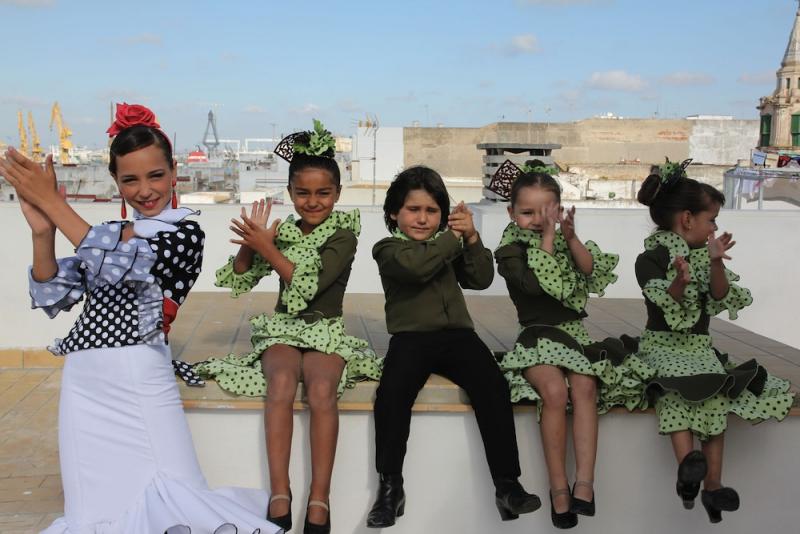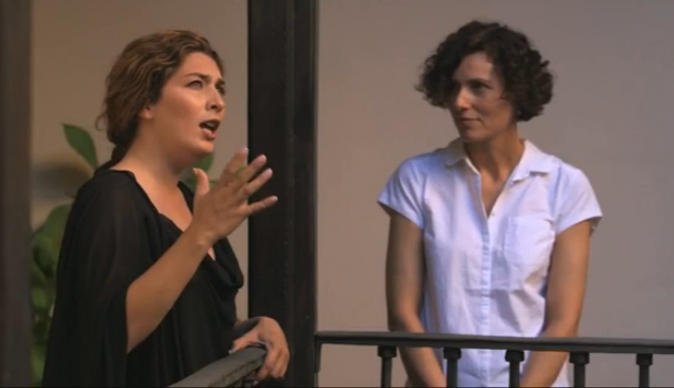Flamenco: Gypsy Soul, BBC Four | reviews, news & interviews
Flamenco: Gypsy Soul, BBC Four
Flamenco: Gypsy Soul, BBC Four
Our investigator is told exactly what she wants to hear

Here's an association test - what's next in the sequence: flamenco, gypsy, soul? Yes, you win the free tourist trip to Andalucía along with writer Elizabeth Kinder, with whom you will almost certainly enjoy weak sangria and tapas while stumbling amusingly in bad Spanish, and you won't be troubled by a single unfamiliar thought about this alluring form of dance, music and poetic song.
Flamenco is so hackneyed a part of the Spanish package that it's certainly time to chisel through the candy to seek the bitter heart of the real thing. But there's always something hokum when a presenter declares her mission to penetrate an ancient mystery and find its relevance today. It's a fair bet that the intention is to do no more than buff the said mystery tantalisingly up. Even when a good part of the mystery is the kind of social oppression all can be glad to have seen the back of.
 This was an infuriatingly fluffy documentary. Directed by Ben Whalley, Kinder promised to reveal “a glimpse of a timeless gypsy way of life as it has been preserved down the centuries”. (Right, Kinder with singer Estrella Morente.) But the “way of life” for flamenco has, for decades at least, largely been in the frills and olés of tourist cafés and professional dance circuits, with legends colourfully manufactured and loud rows about who's a real gypsy and who isn't.
This was an infuriatingly fluffy documentary. Directed by Ben Whalley, Kinder promised to reveal “a glimpse of a timeless gypsy way of life as it has been preserved down the centuries”. (Right, Kinder with singer Estrella Morente.) But the “way of life” for flamenco has, for decades at least, largely been in the frills and olés of tourist cafés and professional dance circuits, with legends colourfully manufactured and loud rows about who's a real gypsy and who isn't.
The challenge is that flamenco eludes categories, its origins being so turbulent and various, and yet its product so focused and distinctive. A gift for TV, you would think.
The goatherd sang with vivid, regretful pain. We weren't told that he is a world-renowned professional singer
Kinder duly trotted round summer beautyspots, Seville, the Alhambra, Cadiz, Jerez, beaches, bars, palaces and fiestas, reiterating how she hoped to find "ancient gypsy culture" still "relevant". Did she still hope to find oppressed minorities and stateless troubadours? She seemed inclined to read an inordinate amount into some Spanish women's admission that they sing while they're cleaning the house.
But flamenco's social relevance stretches far beyond Spain in any case. It's a fusion produced communally between desperate and disparate travelling peoples, migrants from Eastern Europe, North Africa, the Mediterranean, Persia, peoples divided by languages but united by the outsiders' need to stay alive. We were told the interesting supposition that flamenco's unpredictable and tricky rhythms may have emerged from gypsy blacksmiths singing as they hammered horseshoes - there was some artful filming of, supposedly, the "last of the gypsy blacksmiths" working today.
 We sped past the politics: Federico García Lorca's watershed rediscovery of flamenco in 1922 and General Franco's 1970s manipulation of an art of dispossession into a sugary saviour of the national economy. We lingered in the safe harbour of showbusiness, with the guitars and art-flamenco stars (pictured, the splendid Paco Peña). We could have done instead with much more of the intriguingly raw bits of early 20th-century film of gypsy field-workers and big-bottomed grannies shaking down a rhythm as if settling down the grain in a sack.
We sped past the politics: Federico García Lorca's watershed rediscovery of flamenco in 1922 and General Franco's 1970s manipulation of an art of dispossession into a sugary saviour of the national economy. We lingered in the safe harbour of showbusiness, with the guitars and art-flamenco stars (pictured, the splendid Paco Peña). We could have done instead with much more of the intriguingly raw bits of early 20th-century film of gypsy field-workers and big-bottomed grannies shaking down a rhythm as if settling down the grain in a sack.
It was extraordinary that no attention was paid to the real mystery of flamenco, the part that the English listener can't take hold of, its language and fabulously concise poetry. It's the bleak lyrics that plant the afilla cracks and gravel in the voices, and the honeyed verbal sensuality that puts the skittishness into some of the music and dancing.
Flamenco poetry has been sung for more than 200 years, compacted, explosive pillules of emotion. A typical lyric lingers on the eroticism of a girl's hair comb, or stops the world for two agonised minutes just to deliver the line: “In the corner I find you crying.” So why the blazes no English subtitles?
That latter song was delivered by the grizzled goatherd El Cabrero, who was filmed in his goat shed picturesquely haloed in half-light. You can’t sing siguiriyas softly like chocolate in the sun, he said pointedly; a siguiriya is about a situation in which you find yourself not wanted or not loved.
He looked tough and worn. He sang with vivid, regretful pain. Kinder wept. As we might have, if we'd been shown the words. We weren't told that the grizzled goatherd is a deservedly world-renowned professional singer, even though that would have prompted some genuinely relevant questions about where flamenco and gypsy culture are now. It was much of a piece with the Seville housing estate where unemployed men assured Kinder with a grin that they had no money for food but hey, they were happy, they had their flamenco. I guess she was being told what she wanted to hear and what she wanted us to hear. It comes to something when you find out more on YouTube than in an hour on the Beeb.
Add comment
The future of Arts Journalism
You can stop theartsdesk.com closing!
We urgently need financing to survive. Our fundraising drive has thus far raised £49,000 but we need to reach £100,000 or we will be forced to close. Please contribute here: https://gofund.me/c3f6033d
And if you can forward this information to anyone who might assist, we’d be grateful.

Subscribe to theartsdesk.com
Thank you for continuing to read our work on theartsdesk.com. For unlimited access to every article in its entirety, including our archive of more than 15,000 pieces, we're asking for £5 per month or £40 per year. We feel it's a very good deal, and hope you do too.
To take a subscription now simply click here.
And if you're looking for that extra gift for a friend or family member, why not treat them to a theartsdesk.com gift subscription?

Comments
Couldn't agree more...it's
I agree with most of this.
I had really been looking
Entirely agree with review.
Where the hell was Nuevo